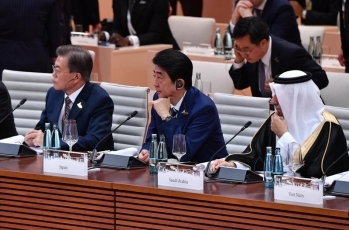G20 (Summit on Financial Markets and the World Economy)
G20 Hamburg Summit
 (Photo: Cabinet Public Relations Office)
(Photo: Cabinet Public Relations Office)
 (Photo: Cabinet Public Relations Office)
(Photo: Cabinet Public Relations Office)
On July 7 and 8, 2017, Mr. Shinzo Abe, Prime Minister of Japan, attended the G20 Hamburg Summit held in Hamburg, the Federal Republic of Germany. The overview is as follows.
1. Overview
The theme of this G20 Hamburg Summit was “Shaping an Interconnected World,” and based on that theme the leaders held frank exchanges of views on topics such as how the G20 can coordinate to respond to various downside risks that threaten global economic growth, which is still weaker than desirable, while strengthening that growth. Following the Summit a G20 Leaders’ Statement (outline (PDF)/provisional translation (PDF)/English text (PDF)) was adopted.
The G20 is the premier forum for international economic cooperation, and at Session 1, “Economic Growth and Trade,” which dealt with the most important challenges facing the G20, Prime Minister Abe led the leaders’ discussion as the lead speaker. H.E. Dr. Angela Merkel, Federal Chancellor of Germany, who chaired the Summit, placed particular importance on the issues of countering terrorism and promoting women’s empowerment, and Prime Minister Abe also performed an active role with regard to these two issues by contributing to the discussion in a retreat on countering terrorism, and by participating in an event to launch the Women Entrepreneurs Finance Initiative.
In particular, at Session 1, “Economic Growth and Trade,” where Prime Minister Abe served as the lead speaker, he introduced the latest outcomes of the “three arrows” of Abenomics, and highlighted the ongoing need to use all policy tools – monetary, fiscal and structural. Furthermore, Prime Minister Abe pointed out that in order to ensure that the fruits of economic growth reach all corners of society, it will be important to create a “virtuous cycle of growth and distribution” by promoting innovation and enhanced productivity, along with realizing inclusiveness. A number of leaders expressed support for Prime Minister Abe’s suggestions.
2. Main outcomes of the Summit
The Government of Japan, including Prime Minister Abe, argued powerfully for the areas below in particular, which were also viewed as important at the G7 Taormina Summit in May, and a consensus was reached by the G20.
(1) Use all policy tools – monetary, fiscal and structural – individually and collectively to respond to downside risks and strengthen global economic growth. Furthermore, when pursuing economic growth and job creation, promote greater inclusiveness and fairness and eliminate disparities.
(2) Maintain open markets, and continue to fight protectionism, including all unfair trade practices.
(3) Further strengthen cooperation in order to deal with the problem of excess capacity in industrial sectors such as steel.
(4) Affirm its strong commitment by the United States to an approach that lower emissions , and a strong commitment to the Paris Agreement by the other G20 members.
(5) Along with promoting women’s empowerment, launcha Women Entrepreneurs Finance Initiative in order to expand support for women entrepreneurs in developing countries based on that perspective.
3. Retreat (terrorism)
Additionally, on the first day of the Summit a discussion on “countering terrorism” took place at a retreat that only the G20 leaders attended, and the Hamburg G20 Leaders’ Statement on Countering Terrorism (outline (PDF)/English text (PDF)) was issued on the same day.
Prime Minister Abe explained that it is deeply regrettable that large numbers of innocent citizens are being robbed of their lives in the succession of atrocious and inhuman acts of terrorism occurring in regions worldwide, and Japan, as a G20 member and as a member of the United Nations Security Council (UNSC) member, is determined to fight terrorism with the international community.
Furthermore, Prime Minister Abe cited geopolitical risk in addition to terrorism as factors shackling global economic growth, and emphasized that North Korea’s nuclear and missile development constitutes new levels of threat and is the international community’s most immediate priority. In addition, Prime Minister Abe explained the ballistic missile launch by North Korea on July 4, just prior to this G20 Summit, and stated that North Korea’s continued provocative actions, which it is undertaking despite repeated warnings, are totally unacceptable. Prime Minister Abe expressed the view that the international community should intensify pressure on North Korea, including by promptly adopting a UNSC resolution that incorporates strict sanctions, and stated that he hopes to continue coordinating with the G20 countries.
4.G20 Presidency in 2019
At this Summit it was decided that Japan will be the G20 Presidencyfor 2019. Japan will demonstrate even greater leadership in the G20 on the basis of its efforts and contributions at G20 Summits thus far.
[Reference] G20 Hamburg Summit
(1) Schedule
Friday, July 7
● Retreat (G20 members only) [Fighting terrorism]
● Session 1 (working lunch) [Global Growth and Trade]
● Session 2 [Sustainable Development, Climate and Energy]
Saturday, July 8
● Session 3 [Partnership with Africa, Migration and Health]
● Session 4 (working lunch) [Digitalization, Women’s Empowerment and Employment]
● Closing session
(2) Participating countries and international organizations:
(i) G20 members
Japan, Italy, Canada, France, the United States, the United Kingdom, Germany, the European Union (EU), China, Russia, Argentina, Australia, Brazil, India, Indonesia, the Republic of Korea, Mexico, Saudi Arabia, South Africa, Turkey
(ii) Invited countries
Spain, the Netherlands, Norway, Singapore, Viet Nam (Asia-Pacific Economic Cooperation (APEC) chair), Senegal (New Partnership for Africa's Development (NEPAD) chair), Guinea (African Union (AU) chair)
(iii) International organizations
UN, International Monetary Fund (IMF), World Bank, World Trade Organization (WTO), International Labour Organization (ILO), Financial Stability Board (FSB), Organisation for Economic Co-operation and Development (OECD), World Health Organization (WHO)

